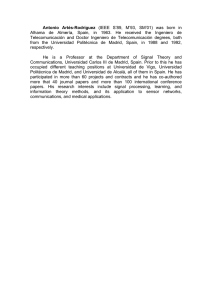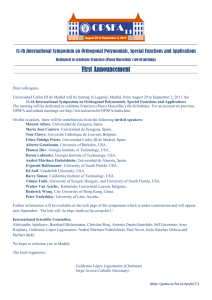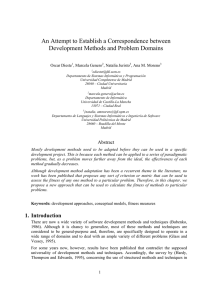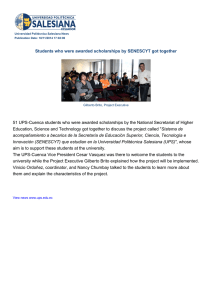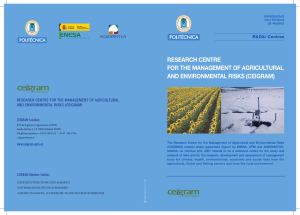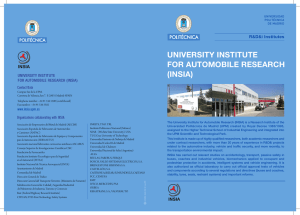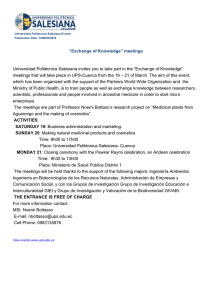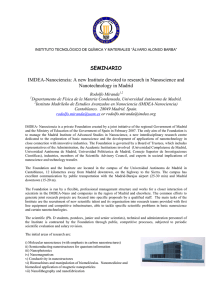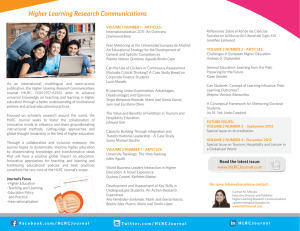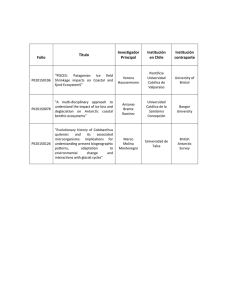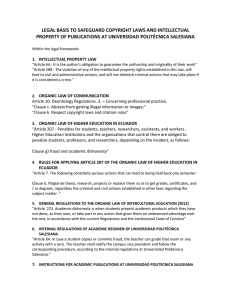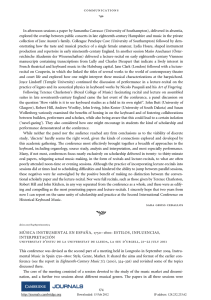CENTER FOR ENERGY EFFICIENCY AND SMART BUILDING
Anuncio
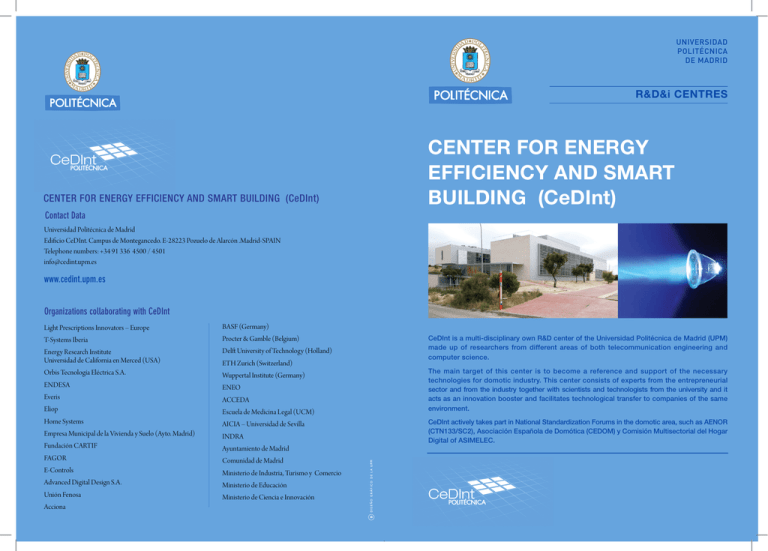
UNIVERSIDAD POLITÉCNICA DE MADRID R&D&i CENTRES CENTER FOR ENERGY EFFICIENCY AND SMART BUILDING (CeDInt) CENTER FOR ENERGY EFFICIENCY AND SMART BUILDING (CeDInt) Contact Data Universidad Politécnica de Madrid Edificio CeDInt. Campus de Montegancedo. E-28223 Pozuelo de Alarcón .Madrid-SPAIN Telephone numbers: +34 91 336 4500 / 4501 info@cedint.upm.es www.cedint.upm.es Organizations collaborating with CeDInt Light Prescriptions Innovators – Europe BASF (Germany) T-Systems Iberia Procter & Gamble (Belgium) Energy Research Institute Universidad de California en Merced (USA) Delft University of Technology (Holland) Orbis Tecnología Eléctrica S.A. Wuppertal Institute (Germany) ENDESA ENEO Everis ACCEDA Eliop Escuela de Medicina Legal (UCM) Home Systems AICIA – Universidad de Sevilla Empresa Municipal de la Vivienda y Suelo (Ayto. Madrid) INDRA Fundación CARTIF Ayuntamiento de Madrid FAGOR Comunidad de Madrid E-Controls Ministerio de Industria, Turismo y Comercio Advanced Digital Design S.A. Ministerio de Educación Unión Fenosa Ministerio de Ciencia e Innovación Acciona ETH Zurich (Switzerland) CeDInt is a multi-disciplinary own R&D center of the Universidad Politécnica de Madrid (UPM) made up of researchers from different areas of both telecommunication engineering and computer science. The main target of this center is to become a reference and support of the necessary technologies for domotic industry. This center consists of experts from the entrepreneurial sector and from the industry together with scientists and technologists from the university and it acts as an innovation booster and facilitates technological transfer to companies of the same environment. CeDInt actively takes part in National Standardization Forums in the domotic area, such as AENOR (CTN133/SC2), Asociación Española de Domótica (CEDOM) y Comisión Multisectorial del Hogar Digital of ASIMELEC. CENTER FOR ENERGY EFFICIENCY AND SMART BUILDING RESEARCH LINES DOMOTICS ENGINEERING OPTICAL ENGINEERING CeDInt has researchers with expertise in environmental intelligence that work on the design of automatic systems to control consumption in buildings and thus improve the energetic efficiency thereof. These systems reduce expenses in electrical energy, gas and water in buildings what implies an economic saving and a decrease in the greenhouse effect gases and CO2 emissions. CeDInt develops advanced lighting systems based on LEDs (light-emitting diodes). CeDInt works on communication systems, especially on wireless networks to connect sensors and actuators, that use both RF and optical signals. These networks are useful to connect measurement sensors and control mechanisms present in buildings and thus activate or deactivate the different electrical appliances (lighting, air conditioning, electrical household appliances, …) in accordance to the consumption reduction strategy previously mentioned. Another field of application of these optical systems developed at CeDInt relates to non-guided optical communications. CeDInt also designs optical concentration systems to improve photovoltaic solar energy system output. CeDInt designs and tests high effective-optical projection systems aiming to obtain ultra-compact projection displays ideal for domotic applications, especially for home-cinema. CeDInt works also on monitoring systems, so that users know at any time what the up-to-date consumption is. These works are supported by domotic usability tests which analyze user reactions when they are about to use these systems. The aim is to determine if systems are simple or complicated for users and thus manage to reduce technophobia as much as possible. CeDInt also carries out an important biometric identification activity, working in high security applications mainly based on the iris pattern recognition, although it also develops other identification systems based on fingerprint and face. These systems are very useful to control people access to high security buildings (such as nuclear power station, a biological laboratory or other similar facilities). VIRTUAL REALITY CeDInt works in virtual reality projects, carrying out research applied to domotics and housing in general (virtual visits to buildings). CeDInt also takes part in activities for the inclusion of disabled people and in medical applications, specifically in the field of legal and forensic medicine.
